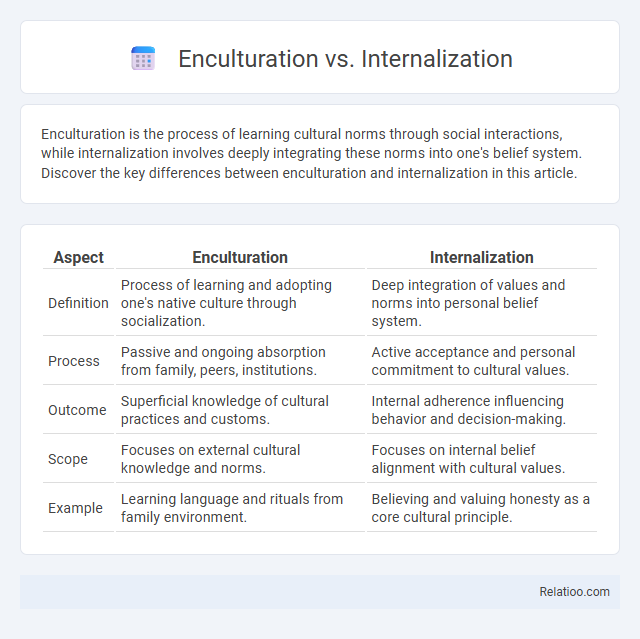Enculturation is the process of learning cultural norms through social interactions, while internalization involves deeply integrating these norms into one's belief system. Discover the key differences between enculturation and internalization in this article.
Table of Comparison
| Aspect | Enculturation | Internalization |
|---|---|---|
| Definition | Process of learning and adopting one's native culture through socialization. | Deep integration of values and norms into personal belief system. |
| Process | Passive and ongoing absorption from family, peers, institutions. | Active acceptance and personal commitment to cultural values. |
| Outcome | Superficial knowledge of cultural practices and customs. | Internal adherence influencing behavior and decision-making. |
| Scope | Focuses on external cultural knowledge and norms. | Focuses on internal belief alignment with cultural values. |
| Example | Learning language and rituals from family environment. | Believing and valuing honesty as a core cultural principle. |
Understanding Enculturation: Definition and Concepts
Enculturation involves the process by which individuals learn and adopt the values, customs, and behaviors of their culture, shaping their identity and social norms. Internalization refers to the deep integration of these cultural norms into your belief system, making them automatic and guiding your actions unconsciously. Understanding enculturation helps you recognize how cultural transmission occurs through social interactions, language, and education, forming the foundation of your worldview.
What Is Internalization? Key Principles Explained
Internalization is the psychological process through which individuals absorb and integrate societal norms, values, and beliefs into their own identity, making these external influences a part of their inner self. Key principles of internalization include deep cognitive acceptance, where the external standards become self-imposed, and behavioral alignment, ensuring that your actions consistently reflect these adopted norms without external enforcement. This process differs from enculturation, which is the broader social learning of culture, by emphasizing the personal embodiment and commitment to these cultural elements.
The Process of Enculturation in Society
The process of enculturation in society involves the transmission of cultural norms, values, language, and behaviors from one generation to the next, ensuring social continuity and cohesion. Individuals learn and internalize societal expectations through family interactions, educational systems, and community participation, shaping their identity and social roles. This cultural learning process contrasts with internalization, where societal norms become an intrinsic part of an individual's belief system, and socialization, which broadly encompasses all mechanisms of acquiring social skills and knowledge.
How Internalization Shapes Individual Behavior
Internalization shapes individual behavior by embedding societal norms, values, and beliefs deeply within a person's psyche, leading to automatic and unconscious adherence to cultural expectations. Unlike enculturation, which is the broader process of learning cultural traits through social interaction, internalization transforms external rules into personal moral standards, guiding actions even in the absence of social surveillance. This psychological integration ensures that behavior aligns with cultural norms, influencing decision-making, identity formation, and social conformity.
Enculturation vs Internalization: Core Differences
Enculturation involves the process by which individuals learn and adopt the cultural norms, values, and behaviors of their surrounding society, usually through observation and interaction from an early age. Internalization, on the other hand, refers to the deeper psychological process where cultural principles become an integral part of Your identity and guide Your thoughts and actions subconsciously. The core difference lies in enculturation being the external acquisition of culture, whereas internalization is the internal embedding and acceptance of those cultural norms as personal beliefs.
Social Influences on Enculturation and Internalization
Social influences on enculturation shape individuals through family, peers, educational systems, and media, embedding cultural norms and values from early development. Internalization involves the deep integration of these socially transmitted values into personal beliefs and behaviors, leading to consistent adherence even in the absence of external reinforcement. Both processes rely heavily on social contexts, yet internalization signifies a more profound acceptance where culturally influenced principles become intrinsic motivations guiding actions.
Psychological Perspectives on Internalization
Internalization in psychological perspectives refers to the deep integration of societal norms, values, and beliefs into Your own cognitive framework, shaping behavior without external enforcement. Unlike enculturation, which is the broader process of learning cultural norms through observation and interaction, internalization involves the personal acceptance and embodiment of those standards as intrinsic motivations. This psychological mechanism ensures that cultural rules become self-regulated, influencing decisions, emotions, and identity formation over time.
Cultural Transmission and the Role of Enculturation
Enculturation is the primary process of cultural transmission through which individuals learn and adopt the values, norms, and behaviors of their society, shaping your worldview and social identity. Internalization involves the deep integration of cultural norms into one's self-concept, making external societal expectations internal guides for behavior. Unlike simple cultural transmission, enculturation actively involves your continuous interaction with social environments, ensuring the preservation and evolution of cultural knowledge across generations.
Real-Life Examples: Enculturation and Internalization in Action
Enculturation shapes your behavior through cultural immersion, such as a child learning social norms by observing family traditions, while internalization deeply embeds these norms into your identity, like adopting a cultural value so fully it influences decision-making unconsciously. For example, growing up in a bilingual household exemplifies enculturation through language exposure, whereas internalization occurs when you instinctively think and communicate in both languages. These processes demonstrate how cultural knowledge transitions from external observation to an integral part of your worldview.
Implications for Education and Social Development
Enculturation, internalization, and socialization each play distinct roles in shaping individual behavior and cultural understanding, with enculturation involving the gradual assimilation of cultural norms through social contexts. Internalization refers to the deep integration of these norms into your personal value system, influencing decision-making and self-regulation. Educational strategies that acknowledge these processes promote effective social development by fostering cultural competence and encouraging reflective learning experiences that align personal and societal goals.

Infographic: Enculturation vs Internalization
 relatioo.com
relatioo.com